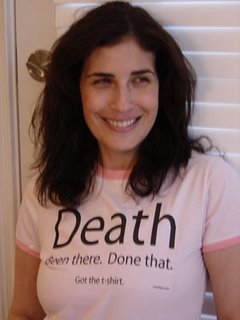A lot of my readers have asked me to tell the full story of my heart attack--so here it is.
At the age of 37, I thought I was in great health. I had run regularly from the age of 12, worked as a weight trainer at the New York University gym and practiced karate. Although I never thought I was invincible, I had no idea that I would have a heart attack. My family had always had a history of cancer so I figured that if I got sick, this would be my fate (hopefully later on down the line). However, one day I finished working out in the gym and was driving home with my husband when I became short of breath. It was an awful feeling--I felt like I was smothering to death and going to pass out. My husband called 911 and was told to get me to the nearest hospital which he did.
Despite the fact that I was short of breath and shaking like a leaf, the doctor decided I was allergic to something in the gym and gave me a shot of benadryl. Actually, I later learned that shortness of breath and a sense of impending doom or death were signs (especially in women) of heart problems. I felt ok once I left the hospital and even for a week or two later. I was on vacation in Charleston, South Carolina when I again got short of breath and could not walk. I was so dizzy, scared and light-headed that I spent the day in bed until finally that night, I went to an emergency room. I told the doctors about the allergy reaction that the last emergency room thought I had and they tried some breathing treatments for asthma.
Amazingly, while in the emergency room, a man in his thirties or forties came in with shortness of breath. He was whisked off for heart tests and his wife and two little children were there crying. I felt so sorry for them. Later, I saw a doctor telling his wife that he had stomach problems and his heart was in good condition. If only I could have said the same! The doctors finally did an EKG after I told them that the breathing treatments were not working. The results said that I had a possible MI. A cardiologist came into the room, looked at the reading and shrugged, stating that many thin women in their 30's who were athletic had a similar reading. I took his word for it and left.
Two doctors and an emergency room visit later, I still had no answer to why I was shaking, short of breath and could barely walk at times from weakness. I thought at times I was having mini strokes. One emergency room doctor refused to look at my abnormal EKG when I came to the hospital; he was too busy dealing with a female coke addict and decided that I was another example of an anxious woman having a panic attack.
I finally persuaded my regular doctor to quit prescibing me Effexor (an antidepressant) and to look at my heart. He finally sent me for tests. He called back and told me to get to the hospital. My father was with me at the time and took me to the hospital where the orderlies thought he was the one with heart problems and told him to get in the wheelchair. I would have laughed myself silly if I had not been so ill. I had tests including a heart cath that helps doctors to see inside the heart. Later, when I was back in my room, the cardiologist came in and told me that I had suffered from a heart attack and also had a ventricular aneurysm (a ballooned out area of the heart) as a result of not resting my heart after the heart attack. I had been told that I had panic disorder so I thought that exercise would be good.
I would like to say that once I got treatment that my problems were over but they had just begun. I was sick with panic attacks for several years. Finally, after more tests in February of 2005, I was told I had ventricular tachycardia and venticular fibrillation (which was triggered during testing). A few days later, I received an ICD (implantable cardioverter defibrillator) which is a device that will shock you if you have a serious rythm problem. I also received the life-saving drug Tikosyn, which is so potent, I had to take it for five days in the hospital to make sure I could tolerate it.
For the first time in years, I feel almost normal. I give thanks everyday for the amazing advances in heart research over the past 15 years. I know it sounds cliche, but I feel lucky just to be alive. When other people in their thirties and forties complain about their aches and pains, I just laugh--I feel lucky to get up in the morning without feeling dizzy or nearly fainting.
Women have been led to believe that breast cancer is the number one killer of women. This could not be further from the truth. Almost one half million women die each year from heart disease. Breast cancer kills only 40,000. The sad part is that half of all the women who have a heart attack each year die before they reach the hospital. I believe this is partly because women do not take symptoms of heart attacks seriously--they wait too long before going to the hospital and do not address heart issues with their doctors. Doctors are to blame at times; they buy into the myth that women are more likely to get breast cancer and that heart disease is for men. In order to change this, women must start asking their doctor to discuss heart disease prevention with them from an early age and to demand testing if they have symptoms. Hopefully, awareness of heart disease will infiltrate the public in much the same way breast cancer awareness did--but it will not begin until women decide that red dresses for heart disease are just as important or maybe more so (given the large number of women dying) than pink ribbons are for breast cancer.
Update: Here is a link to my story and more info on women's heart facts at
www.medtees.com.




